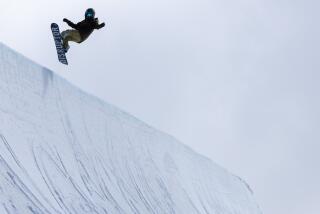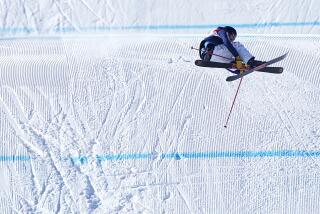Bouncing Back; Falling Flat
- Share via
HAKUBA, Japan — Bruised but unbowed, Austria’s Hermann Maier overcame the physical and mental fallout from one of the most spectacular crashes in alpine skiing history and won the super-giant slalom at the Winter Olympics on Monday.
To everyone but Maier, it seemed easy. His time was 1 minute, 34.82 seconds, more than six-tenths of a second faster than the 1:35.43 of the co-silver medalists, Didier Cuche of Switzerland and Hans Knauss of Austria.
“Maybe he really is an alien, I don’t know,” said Alex Wechselberger, Maier’s girlfriend, after it became apparent no one would threaten him.
But for the other skiers, the ones who have become accustomed to competing for second place this season because of Maier’s fearless, caution-be-damned approach, this was just another day on the slopes.
Asked if he expected Maier to bounce back so quickly from the horrifying crash in Friday’s downhill, American Chad Fleischer said, “Totally. He’s Hermann.”
One of Fleischer’s teammates, Tommy Moe, said he knew as soon as he saw the Austrian inspecting the course before the race that he was the same Maier who has dominated the super-G this season, winning all four races on the World Cup circuit by larger margins that the one Monday.
“He gets that crazy-eyed look, like a barbarian straight out of the woods of Austria,” Moe said.
But even though Maier might have looked like the Hermannator, his nickname on the circuit, he didn’t feel like it. Neither, he thought, did he ski like it.
He cut his post-race press conference short so that he could see a doctor for treatment on his right knee and left shoulder. His knee has been particularly troublesome, requiring a pain-killing shot before the race.
He received therapy late into the night after Friday’s crash, in hopes that he might recover sufficiently to compete the next morning in the super-G. Fortunately for him, the start was postponed for 72 hours because of weather conditions.
Maier was equally concerned about his mental fitness. Despite the fact that the replay has been shown hundreds of times on Japanese television, he has, somehow, managed to avoid seeing his crash. He said he doesn’t want to see it until after the final World Cup race this season.
“I think it will make me a little bit scared,” he said. “The next downhill in Kvitfjell (Norway) is also a difficult course. I have a lot of time after the season to see the crash.”
He never let on to his teammates, however, that he was the least bit nervous about racing again, trading jokes with them about the crash as soon as he returned to the hotel from the downhill.
“He has a lot of self-confidence,” Knauss said. “Two days later, I looked at him and he was the old Maier.
“He’s unbelievable. I know what it means to crash like this. It really does something to your head and you can only go 90%. But Hermann came back 110%.”
Not so, Maier said.
“Today, I was not so aggressive,” he said. “It was hard for me after the big crash, the tough crash. I was a little bit careful. That was good for me.”
With their two medals Monday, the Austrian men are dominating these Olympics like they have the World Cup circuit this season. They have five medals, including two golds, in three races.
The United States was encouraged because of two top-10 finishes, Daron Rahlves’ seventh and Moe’s eighth. For Moe, the downhill gold medalist four years ago in Lillehammer, Norway, it was his highest finish in an international race since he suffered a severe knee injury in 1995.
But, a full 72 hours later, discussion was still dominated by The Crash.
If Maier had backed off a little at the top of the course, he might also have won the downhill. Instead, he pushed it as usual--”Hermann always takes 5% to 10% more risk than the rest of us,” Knauss said--and ended up as the lone, careening figure in a highlight film that no doubt will be shown for decades.
Skiing at about 65 mph, he lost an edge around the seventh gate, became airborne for about 50 meters, did three somersaults, crashed through two snow fences and went beyond another before landing in deep and, fortunately, soft snow.
One Austrian team doctor said Maier might have died or been seriously injured if he weren’t blessed with an 18 1/2-inch neck.
Asked if it was the worst fall ever for him, he said, “It was worst enough for me.”
Maier blamed international ski federation officials. In their anxiousness to conclude the downhill on an increasingly clogged schedule after two weather-related postponements, they held it on the first day possible without allowing the skiers their normal practice runs. As a result, the skiers had not been on the course since the day of the opening ceremony.
That might not have been a problem, Maier said, if the position of the seventh gate had not been changed in subsequent days. By the time he saw it, it was too late.
“I saw blue light, but I didn’t see Lufthansa,” he said the next day.
Knauss said it was good that the Austrians could joke about a crash. Their ski team has been victimized by several deaths in recent years, both on the slopes and the highways.
Maier’s idol, former world champion Rudy Nierlich, died in an automobile accident. Ulrike Maier, no relation to Hermann, was killed in a skiing accident within weeks of the 1994 Olympics in Norway, where she was expected to star.
“Hermann’s crash made me think of all the teammates we’ve lost,” Knauss said.
“Maybe the Austrian public today thinks only about our victories here, but let’s never forget those who aren’t able to be with us because of accidents.”
When Knauss and Maier saw each other for the first time in the hotel after the crash, they embraced and then told a couple of jokes that Knauss said wouldn’t translate because they were specific to the mountain region in which they were both reared.
“We laughed some,” Knauss said. “But then I told him, ‘Hermann, you were very lucky.’ ”
(BEGIN TEXT OF INFOBOX / INFOGRAPHIC)
MEDALISTS
Alphine Skiing
MEN’S SUPER-G
Gold: Hermann Maier, Austria
Silver: Didier Cuche, Switzerland
Bronze: Hans Knauss, Austria
More to Read
Go beyond the scoreboard
Get the latest on L.A.'s teams in the daily Sports Report newsletter.
You may occasionally receive promotional content from the Los Angeles Times.






